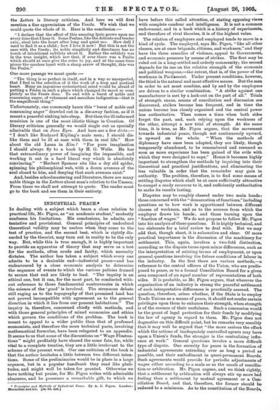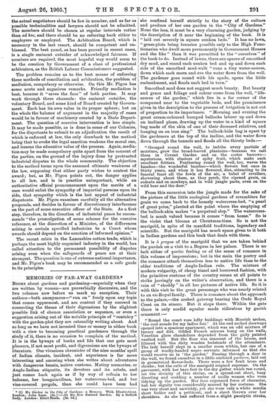IN dealing with a subject which bears a close relation
to practical life, Mr. Pigou, as "an academic student," modestly confesses his limitations. His conclusions, he admits, are tentative and provisional. General principles of undoubted theoretical validity may be useless when they come to the test of practice, and the second best, which is rightly dis- carded by the theorist, may turn out in reality to be the only way. But, while this is true enough, it is highly important to provide an apparatus of theory that may serve as a test for the methods, often crude and faulty, which necessity dictates. The author has taken a subject which every one admits to be a desirable end—industrial peace—and has endeavoured by a close economic analysis to determine the sequence of events to which the various policies framed to secure that end are likely to lead. "The inquiry is an ethical one, but it can, for the most part, be conducted with- out reference to those fundamental controversies in which the science of the good' is involved. The strenuous debate still raging as to the topography of that promised land has not proved incompatible with agreement as to the general direction in which it lies from our present habitations." The inquiry is, therefore, concerned chiefly with methods, and with those general principles of mixed economics and ethics which govern the conditions of the problem. The book is meant to appeal to a wider public than that of professed economists, and therefore the more technical parts, involving mathematical formulae, have been relegated to an appendix. It seems to us that some of the discussions on Wage Fluctua- tions" might profitably have shared the same fate, for, while vital to a complete treatise, they are a little irrelevant to the scheme of the present work. Our one criticism of the book is that the author hesitates a little between two different inten- tions. Some of the preliminaries would be in place in a large organon, but in a popular handbook they read like plati- tudes, and might well be taken for granted. Otherwise we have nothing but praise, for Mr. Pigou writes with admirable clearness, and he possesses a remarkable gift, to which we * Principles and Methods of industrial Peace. By A. C. Pigou. London : N.onillan and Co. [Si. 6d. nat.]
have before this called attention, of stating opposing views with complete candour and intelligence. It is not a common endowment, and in a book which is a history of experiments, and therefore of rival theories, it is of the highest value. .
The relation of employers and employed tends to move in a kind of cycle. The employed, says Mr. Pigou, "like all other classes, are at once brigands, citizens, and workmen," and they have the three remedies of violence, appeal to Government, and economic pressure by means of strikes. The first may be. ruled out in a long-settled and orderly community; the second depends for its use on the relative strength of the economic and political weapons,—the extent, that is, of the power of the workman in Parliament. Under present conditions, however, the third is the natural and most effective means. But the men in order to act must combine, and by and by the employers are driven to a similar combination. "A strike against one manufacturer is met by a lock-out on the part of all." Trials of strength ensue, means of conciliation and discussion are discovered, strikes become less frequent, and in time the unions become less closely organised and the central power less authoritative. Then comes a time when both sides forget the past, and, each relying upon the weakness of the other, attempt a new trial of strength. At the same time, it is true, as Mr. Pigou argues, that the movement towards industrial peace, though not continuously upward, is upward on the whole. "When the methods of diplomacy have once been adopted, they are likely, though temporarily abandoned, to be remembered and resumed so soon as more experience has been gained of the evils with which they were designed to cope." Hence it becomes highly important to strengthen the methods by inquiring into their theoretical and practical justifications, and eliminating the less valuable in order that the remainder may gain in authority. The problem, therefore, is to find some means of settling disputes which shall be at once sufficiently attractive to compel a ready recourse to it, and sufficiently authoritative to make its results lasting.
Disputes may be roughly classed under two main heads: those concerned with the "demarcation of functions," including questions as to how work is apportioned between different classes of workmen, and as to the sources from which the employer draws his hands; and those turning upon the "fraction of wages." We do not propose to follow Mr. Pigou into his analysis of these questions. It is highly technical, and too elaborate for a brief review to deal with. But we may add that, though short, it is exhaustive and clear. Of more practical importance is the discussion of the machinery for settlement. This, again, involves a two-fold distinction, according as the dispute turns upon minor differences, such as the interpretation of existing terms of employment, or upon general questions involving the future conditions of .labour in the industry. In the first there are various methods,—a reference to the central officers of the Union, who are predis- posed to peace, or to a formal Conciliation Board for a given area composed of an equal number of representatives of both sides. It is probable, as Mr. Pigou argues, that wherever the organisation of an industry is strong the peaceful settlement of such interpretative differences is practically assured. The question, therefore, arises whether, if the State is to employ Trade Unions as a means of peace, it should not confer certain privileges upon them to enhance their strength, when strength is of the essence of their usefulness. Such a concession would be the grant of legal protection for their funds by modifying the law of agency in regard to them. Mr. Pigou does not dogmatise on this difficult point, but he remarks very sensibly that it may well be argued that "the more serious the effect which the actions of inadequately controlled agents may have upon a Union's funds, the stronger is the centralising influ- ence at work." General questions involve a more difficult type of dispute. One security for peace is the formation of industrial agreements extending over AS long a period as possible, and their embodiment in quasi-permanent Boards'. Such agreements would provide for periodic adjustments of wages either according to a scale or as the result of concilia- tion or arbitration. Mr. Pigou argues, and we think rightly, that a settlement by arbitration will always stir up more bad feeling than a settlement by mutual agreement or a Con:. ciliation Board, and that, therefore, the former should be reduced to a minimum. As to the constitution of the Boards, the actual negotiators should be few in number, and as far as possible technicalities and lawyers should not be admitted. The members should be chosen at regular intervals rather than ad hoe, and there should be no referring back either to employers or employed. The Arbitration Board, which is necessary in the last resort, should be competent and un- biassed. The best panel, as has been proved in recent cases, is a single eminent outsider of acknowledged fairness. If numbers are required, the most hopeful way would seem to be the creation by Government of a class of professional arbitrators, as the British Labour Commissioners suggested.
The problem remains as to the best means of enforcing these methods of conciliation and arbitration, the problem of mediation, compulsory or otherwise. On this Mr. Pigou has some acute and sagacious remarks. Friendly mediation is best, because it "saves the face" of both parties. It may work through three channels : the eminent outsider, the voluntary Board, and some kind of Board created by Govern- ment. Each has its own value in its proper sphere; but on the whole the balance of argument in the majority of cases would be in favour of machinery created by a State Depart- ment. The question of coercive intervention is less simple. It may be made possible, as is done in some of our Colonies, for the disputants to submit to an adjudication the result of which is enforced at law, the only drawback to the method being that to evoke the legal sanction weakens the moral one, and lessens the educative value of the process. Again, media- tion may be made compulsory quite apart from the consent of the parties, on the ground of the injury done by protracted industrial disputes to the whole community. The objection to the method turns upon the assumed ultimate weakness of the law, supposing that either party wishes to contest the award ; but, as Mr. Pigon points out, the danger applies to all law, and is in practice unimportant, while an authoritative official pronouncement upon the merits of a ease would enlist the sympathy of impartial persons upon its side, that sympathy which is the last appeal of industrial disputants. Mr. Pigou examines carefully all the alternative proposals, and decides in favour of discretionary interference on the part of some executive officer of the State. As a first step, therefore, in the direction of industrial peace he recom- mends "the promulgation of some scheme for the coercive reference, at the discretion of a Minister, of the differences arising in certain specified industries to a Court whose awards should depend on the sanction of informed opinion."
The recent crisis in the Lancashire cotton trade, which is perhaps the most highly organised industry in the world, has called attention to the permanent possibility of disputes arising even when the safeguards of peace are at their strongest. The question is one of extreme national importance, and Mr. Pigou's book may be recommended as a safe guide to its principles.
MEMORIES OF FAR-AWAY GARDENS.*



































 Previous page
Previous page